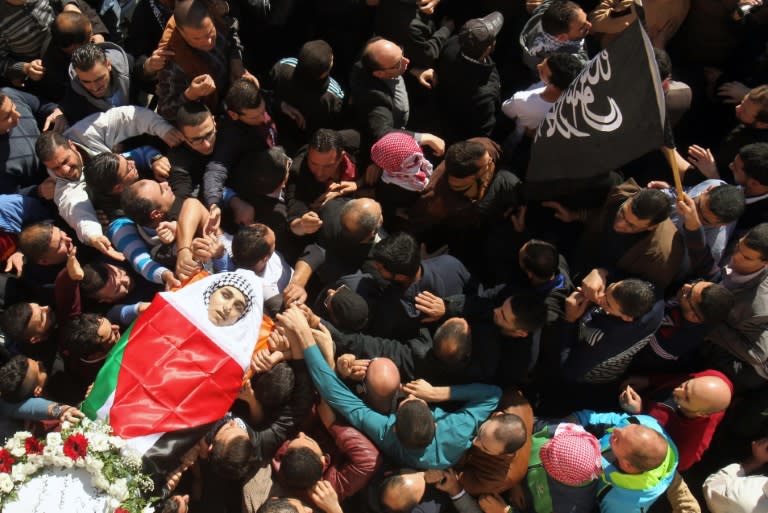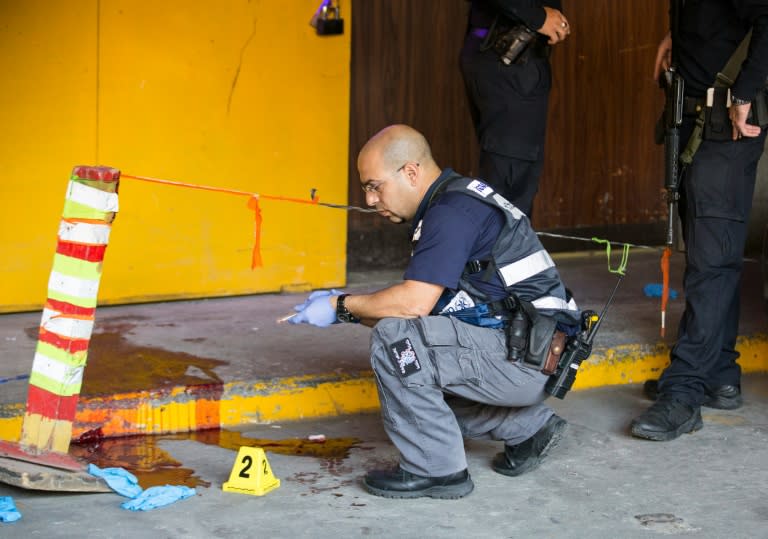Israelis, Palestinians bury dead after surge in violence
Israelis and Palestinians buried their dead on Friday after one of the deadliest days in nearly eight weeks of lone wolf violence that is challenging Israeli security thinking. Meanwhile, dozens of Palestinians were wounded by Israeli fire in clashes in the occupied West Bank and along the Gaza Strip border. Three Israelis, an American and a Palestinian were killed Thursday in two attacks by Palestinians in Tel Aviv and the West Bank. Both assailants were arrested. The killings came after several days of apparent calm, shattering hopes that the violence was subsiding. Violence since the start of October has killed at least 86 people on the Palestinian side including one Arab Israeli, 15 Israelis, an American and an Eritrean. Many of the Palestinians killed have been alleged attackers, while others were shot dead during clashes with Israeli forces. Israeli security officials quietly acknowledge they are preparing for months of attacks. An Amnesty International statement on Friday condemned the "spate of deliberate deadly attacks by Palestinians on civilians" over the past week. "Deliberately attacking civilians is contrary to one of the most fundamental principles of international law and can never be justified," it said. In Kfar Etzion south of Jerusalem, more than 1,000 mostly Orthodox Jews attended the funeral of Yaakov Don. He was killed Thursday when a Palestinian assailant opened fire from a car near a Jewish settlement bloc south of Jerusalem before ploughing into pedestrians. - More stringent checks? - In Hebron, around 2,000 Palestinians crowded outside the Al-Hussein Ibn Ali mosque to mourn Shadi Arafa, who was killed in the same incident. His brother Baha said he was hit by Israeli fire, and an investigation is under way to determine the circumstances of his death. Clashes between Palestinian youths and Israeli security forces erupted after the funeral. The body of the third victim, American Ezra Schwartz, is being flown back to the United States for burial. Two Israelis were killed in the Tel Aviv attack when a Palestinian stormed into an office building with a knife. Rabbi Aharon Issayev, 32, was buried on Thursday and 51-year-old Reuven Aviram on Friday. It was the first attack to take place in Israel's commercial capital since the wave of unrest erupted last month. Analysts said it was worrying, as the perpetrator had a permit to work in Israel, was married with five children and had no previous criminal record. Tens of thousands of Palestinians with permits travel into Israel daily and are traditionally perceived as low threat. Writing in the Israel Hayom newspaper, Yoav Limor suggested the attack may lead to tighter restrictions or "at the very least, more stringent checks". Meanwhile, 11 Palestinians were wounded on Friday in clashes with Israeli security forces near Ramallah, eight were hurt in Hebron and 20 on the Gaza border. Palestinian medical sources said the majority of the injuries were a result of live fire. - Impossible to predict - The army confirmed using small-calibre live rounds near Hebron and the Gaza border at "main instigators" in a bid to disperse "violent riots". A border policeman was lightly injured in the leg at a checkpoint in the West Bank village of Abu Dis after a motorist attempted to hit him with his car, police said. Forces shot at the vehicle, which escaped. Benedetta Berti, senior researcher at the Institute for National Security Studies, said the latest attacks suggested that Prime Minister Benjamin Netanyahu's strategy for containing the violence was failing. "There has been a perception that the stabbings were going to wind down and eventually go away and this could be managed through additional deployment of troops or more checkpoints, but it has just been proven untrue," Berti told AFP. The assailants have largely acted alone rather than in coordination with militant groups, making it nearly impossible to predict an attack. A senior military source told AFP the security services had no previous records on more than 90 percent of assailants. The source noted that a diplomatic push could change the Palestinian feeling that "things are going nowhere," which is fuelling the violence. US Secretary of State John Kerry will be visiting Israel and the West Bank next week. Yoram Schweitzer, a former head of the army's counter-terrorism department, said such attacks were likely to continue. "If somebody is doing an operation on a whim, with no prior planning, most probably we won't have any intelligence about it. So we have to try to defuse these operations on the ground."





